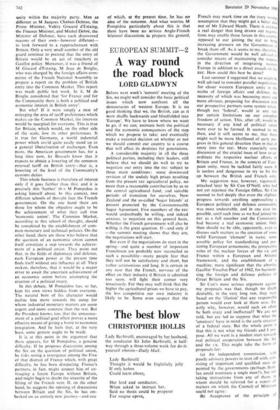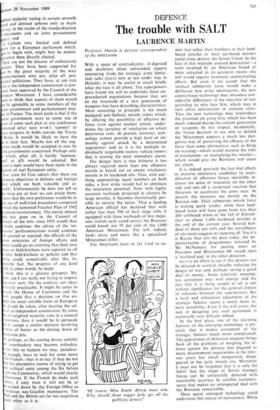EUROPEAN SUMMIT-2
A way round the road block
LORD GLADWYN
Before next week's 'summit' meeting of the Six, we might well consider the basic political issues which now confront all the democracies of western Europe. It is no good thinking that we, the British, can as it were shuffle backwards and blindfolded into `Europe'. We have to know where we want to go, if we can; estimate both the political and the economic consequences of the step which we propose to take; and eventually make a national decision on whether or not we should commit our country to a course that will affect its destinies for generations.
A considerable majority in all the three political parties, including their leaders, still believe that we should do well to try to negotiate our entry into the EEC subject to three main conditions: some downward revision of the unduly high prices resulting from the present EEC agricultural policy, no more than a reasonable contribution by us to the central agricultural fund; and suitable periods of transition for ourselves, New Zealand and the so-called 'Sugar Islands' at present protected by the Commonwealth Sugar Agreement. Five members of the EEC would undoubtedly be willing, and indeed anxious, to negotiate on this general basis. Whether the French government will also be willing is the great question. If—and only if —the summit meeting shows that they are, the negotiations will start.
But even if the negotiations do start in the spring—and quite a number of important Frenchmen are probably now reconciled to such a possibility—many people fear that they will not be satisfactory and short, but rather acrimonious and long. It is certain in any case that the French, nervous of the effect on their industry if Britain is admitted too soon, will fight their corner very tenaciously. For they may well think that the higher the agricultural prices we have to pay, the less competitive our own industry is likely to be. Some even suspect that the
French may mark time on the (very wrong) assumption that they-might get a better dm out of Mr Edward Heath. There is anyhow a real danger that long drawn out negotia- tions may enable those forces in this country opposed to our joining the EEC to bring increasing pressure on the Government to break them off. As it seems to me, therefore, the Government would be well advised to consider means of maintaining the impetus in the direction of integrating western Europe in addition to a direct assault on the e.ec. How could this best be done?
Last summer I suggested that we might be well advised to consider parallel negotiations for closer western European unity in the realm of foreign affairs and defence, the necessity of which was becoming more and more obvious, proposing for discussion with our prospective partners some system which. though not 'federal', would at any rate put certain limitations on our complete freedom of action. This, after all, would be necessary if any kind of political union were ever to be formed. It seemed to me then, and it still seems to me, that there might well be more likelihood of early pro- gress in this general direction than in that of entry into the EEC. More especially some discussion of the crucial issue of how to co- ordinate the respective nuclear efforts of Britain and France, in the context of Euro- pean unity, must be tackled fairly soon. It is useless and dangerous to try to fix this up between the British and French only.
My suggestion was, however, vigorously attacked later by Sir Con O'Neill, who had not yet rejoined the Foreign Office. Sir Con seemed to feel deeply that even the slightest progress towards anything approaching a European political and defence community was most undesirable, and in any case im- possible, until such time as we had joined the EEC as a full member and the Community had become a real economic union. Only then should we be able, apparently, even to discuss such matters as the creation of some valid European 'element' in NATO; some sensible policy for standardising and pro- curing European armaments; the prospective roles of the nuclear forces of the UK and France within a European and Atlantic framework; and the establishment of a machine, more significant that the abortive Gaullist `Fouchet Plan' of 1962, for harmoni- sing the foreign and defence policies of Great Britain and the Six.
Sir Con's most serious argument against my proposals was that, though no doubt desirable, in the very long run, they were based on the 'illusion' that any responsible person would ever look at them now. Ex- actly why, however, would such an effort be both crazy and ineffectual? We are not told, but are led to suppose that what the 'amateurs' have in mind is the early creation of a federal state. But the whole point is that this is not what my friends and I pro- pose. All we want is a modest start towards real political cooperation between the Six and the UK. This might take the form of proposals for: (a) An independent commission, with purely advisory powers to start off with, con- sisting of important and qualified men ap- pointed by the governments (perhaps Bene- lux could nominate a single man?), but not taking instructions from any of them. to whom should be referred for a report all matters on which the Council of Ministers could not agree:
(b) Acceptance of the principle of
dited majority voting in certain severely led and defined spheres only to begin th (e.g. in the realm of the standardisation armaments and an arms procurement y): and (c) Certain very limited and defined ners for a European parliament which. in to begin with, might best be nomin- rather than directly elected.
These are not the dreams of enthusiastic teurs. They have been supported for rs by the great majority of the WEU
liamentarians who are, after all, pro-
'onal politicians. They have, at any rate far as the independent commission is con- . been approved by the Council of the ropean Movement. I have considerable .son to think that aspects of them would en be agreeable to some members of the nt government and parliamentary maj- ty in France. The short point is that if the nt government were to come out in sour of some such plan at any conference mmoned after next week's 'summit' to uss progress in fields outside the Treaty
Rome, it would be likely to have the
I at their feet. Maybe not all the sug- tions made would be accepted in toto by the governments concerned. Perhaps only (which, after all, is hardly 'suprana- nal' at all) would be adopted. But least a start would have been made in the ection of real European unity.
Now, even Sir Con admits that there are uropean objectives in defence and foreign airs which are both valuable and at- nable'. Unfortunately he does not tell us at these are or how we can attain them.
seems that his own preference would be to e use of well-tried procedures compared which the lamented Fouchet Plan of 1962
s almost revolutionary. The stately minuet
ich has gone on in the Council of sisters of the WEU since 1955 would thus doubt continue; the advice of the 'en- iastic' parliamentarians would continue be ignored or rejected; the officials of the rious ministries of foreign affairs and fence would go on asserting that their own ides or field-kitchens were superior to all other field-kitchens or policies and that hing could conceivably alter this in- putable fact. No progress of any kind uld, in other words, be made.
I think this is a gloomy prospect. My nds and I are really not trying to impose erstion' now. On the contrary our ideas strictly practicable. It might be easier to suade the House of Commons and the tish people that a decision on (for ex- pie) the most suitable form of European k should be taken, after hearing the ad- of an independent commission, by some of weighted majority vote in a council ministers, than it would be to persuade m to accept a similar decision involving Price of butter or the closing down of anomie pits.
perhaps, as the coming drama unfolds if unorthodoxy may become orthodox.
t for this to happen we may, paradoxi- IY enough, have to wait for some move the French—that is to say, if they do not pt the alternative course of trying to get r political unity among the Six before join the Community, which would clearly disastrous. If the French do make such move, I only trust it will not be at
turned down by the Foreign Office as insidious neo-Gaullist manoeuvre. The
h and the British are far too suspicious each other as it is.











































 Previous page
Previous page